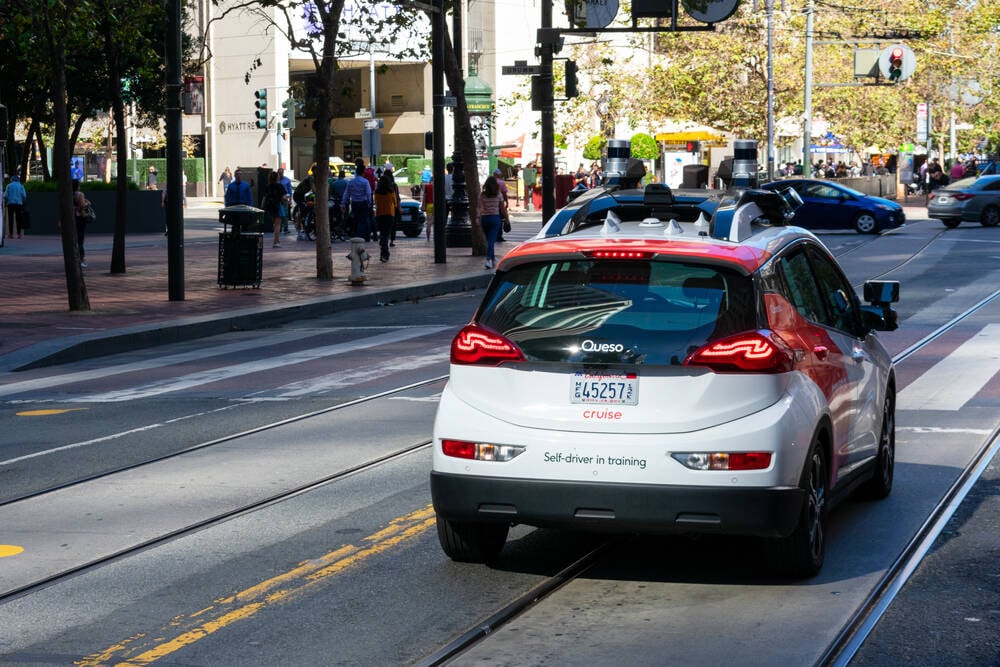
Driverless cars are not subject to traffic citations in California even if they violate driving laws under the state’s current rules.
Unlike vehicles with human motorists, autonomous cars cannot be punished for breaking traffic laws in California. Police in San Francisco were told that “no citation for a moving violation can be issued if the [autonomous vehicle] is being operated in a driverless mode” in an internal memo, first reported by NBC.
Self-driving cars can receive parking tickets, but get off scot-free for violations while in transit if no driver is behind the wheel. In 2018 a test driver operating a Cruise car in self-driving mode was ticketed when the vehicle failed to yield to a pedestrian at a crosswalk. But traffic crimes committed by driverless vehicles can go unpunished since citations can only be issued to humans who were at the wheel.
“Technology evolves rapidly and, at times, faster than legislation or regulations can adapt to the changes,” San Francisco’s Police Chief Bill Scott wrote in the memo.
San Francisco is at the forefront of self-driving car technologies and the city was the first in the US to approve commercial rides for Cruise’s robo-taxi service back in June. But the permit was later revoked after one of its driverless cars struck and dragged a pedestrian along the street in an accident in October last year. The victim had been knocked down into the path of the Cruise vehicle by a hit-and-run human driver in another car.
Months before the incident, the San Francisco Municipal Transportation Agency urged regulatory agencies and lawmakers to slow the expansion of autonomous vehicles. Officials raised concerns that driverless cars often blocked traffic, obstructed buses and emergency vehicles, and have been known to wander into construction works or even crime scenes.
Meanwhile, other states have updated their traffic laws to make driverless car operators liable for violating driving rules. Texas will fine the owners of autonomous vehicles if the technology breaks traffic laws regardless of whether a person is sitting behind the wheel or not. Arizona issues traffic citations to the operators of driverless cars too.
“The fully autonomous vehicle is capable of complying with all applicable traffic and motor vehicle safety laws of this state and the person who submits the written statement for the fully autonomous vehicle may be issued a traffic citation or other applicable penalty if the vehicle fails to comply with traffic or motor vehicle laws,” according to Arizona’s laws.
“Through the California Vehicle Code Section 38750, the DMV can establish requirements consistent with statute by the adoption of regulations to ensure the safe operation of autonomous vehicles on public roads, including but not limited to special rules for registration of autonomous vehicles, new license requirements for operators of autonomous vehicles, and rules for revocation, suspension or denial of any license,” the Golden State’s Department of Motor Vehicles told The Register. There has been no comment from the California Public Utilities Commission.
As of January, Cruise’s commercial permit is still revoked amid an investigation into the aforementioned accident and has temporarily grounded all supervised and manual operations of its autonomous vehicles across the US. Its former CEO Kyle Vogt and other execs resigned in the aftermath of the crash.
Other self-driving startups, however, are continuing to test and deploy their fleets across the country. Waymo, for example, is operating its commercial robo-taxi service to select riders in Phoenix, Arizona, and Austin, Texas. Rival Zoox, backed by Amazon, is driving its L3 level vehicles in San Francisco, Las Vegas, Nevada, and Seattle, Washington. ®
- SEO Powered Content & PR Distribution. Get Amplified Today.
- PlatoData.Network Vertical Generative Ai. Empower Yourself. Access Here.
- PlatoAiStream. Web3 Intelligence. Knowledge Amplified. Access Here.
- PlatoESG. Carbon, CleanTech, Energy, Environment, Solar, Waste Management. Access Here.
- PlatoHealth. Biotech and Clinical Trials Intelligence. Access Here.
- Source: https://go.theregister.com/feed/www.theregister.com/2024/01/02/driverless_cars_tickets/
- :has
- :is
- :not
- 2018
- a
- accident
- across
- adapt
- Adoption
- After
- aftermath
- agencies
- agency
- All
- along
- Amazon
- Amid
- an
- and
- Another
- any
- applicable
- approve
- ARE
- arizona
- At
- austin
- autonomous
- autonomous cars
- autonomous vehicle
- autonomous vehicles
- back
- backed
- BE
- been
- before
- behind
- being
- Bill
- blocked
- Breaking
- breaks
- Buses
- but
- by
- california
- CAN
- cannot
- capable
- car
- cars
- ceo
- Changes
- chief
- City
- CO
- code
- comment
- commercial
- commission
- committed
- comply
- complying
- consistent
- construction
- continuing
- country
- Crash
- Crime
- Crimes
- cruise
- Current
- Department
- deploy
- down
- driver
- Driverless
- driverless cars
- driverless vehicles
- driving
- emergency
- ensure
- establish
- Ether (ETH)
- Even
- evolves
- example
- Execs
- expansion
- Failed
- fails
- faster
- fine
- First
- For
- forefront
- Former
- former ceo
- Francisco
- from
- fully
- get
- Go
- Golden
- had
- Have
- However
- HTTPS
- human
- Humans
- if
- in
- incident
- Including
- internal
- into
- investigation
- Issued
- issues
- ITS
- January
- jpg
- june
- known
- kyle
- LAS
- Las Vegas
- Last
- Last Year
- later
- lawmakers
- Laws
- Legislation
- Level
- License
- Limited
- make
- manual
- May..
- Mode
- Motor
- moving
- municipal
- NBC
- NEVADA
- New
- no
- october
- of
- off
- officials
- often
- on
- ONE
- only
- operated
- operating
- operation
- Operations
- operators
- or
- Other
- owners
- parking
- path
- person
- phoenix
- plato
- Plato Data Intelligence
- PlatoData
- Police
- public
- raised
- rapidly
- receive
- Regardless
- Registration
- regulations
- regulatory
- Requirements
- resigned
- riders
- rides
- Rival
- roads
- rules
- s
- safe
- Safety
- San
- San Francisco
- scenes
- scott
- Seattle
- Section
- select
- self-driving
- self-driving car
- service
- since
- Sitting
- special
- Startups
- State
- Statement
- States
- Still
- street
- subject
- suspension
- Swerve
- Technologies
- Technology
- test
- texas
- than
- that
- The
- The State
- their
- There.
- they
- this
- Through
- ticketed
- tickets
- times
- to
- told
- too
- traffic
- transit
- transportation
- under
- updated
- us
- utilities
- VEGAS
- vehicle
- Vehicles
- Victim
- Violating
- VIOLATION
- Violations
- was
- washington
- waymo
- were
- Wheel
- when
- whether
- while
- WHO
- will
- with
- works
- written
- wrote
- year
- Yield
- zephyrnet








